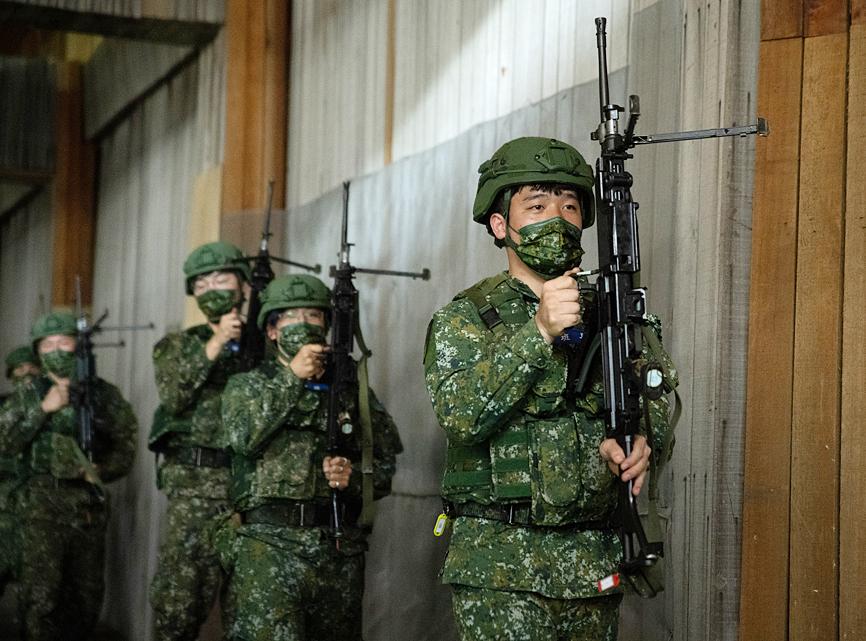The Economist yesterday said that “promises to fight for Taiwan” are an ineffective deterrent and could instead lead to a diplomatic fallout with Beijing, something that could be avoided by taking practical action to strengthen Taiwan’s self-defense capabilities.
The 180km-wide Taiwan Strait and the US military stand as the two main components deterring Beijing from attacking Taiwan, but Beijing is working to overcome both obstacles, the weekly said, adding that some US generals have said that Beijing could attack Taiwan by 2030.
The article, titled “How to deter China from attacking Taiwan,” says Taiwan, the US and its allies must learn the lessons of Russia’s invasion of Ukraine — the most important of which is that “the threat is real.”

Photo: CNA
Instead of brainstorming for strategies during battle, it behooves the US and Taiwan to prepare now, the article said, adding: “The more prepared Taiwan is for the attack, the lesser the chances that China will take the risk.”
Taiwan has made the right decision in cutting down on its reliance on conscripts and moving to increase the capabilities of a professional standing military, the article said.
Nonetheless, Taiwan should continue to provide its eligible men — and perhaps women — with military training to create a capable homeland defense force, it added.
Taiwan should increase its defense spending, as its current expenditure of 2 percent of GDP is still on the low side, the article said, citing that Israel’s defense spending amounts to 5.6 percent of GDP.
Taiwan should not expect to match Beijing in defense expenditure or the scale of available forces to be committed and should, instead, make itself a “thorny problem” for its enemies, it said.
The overall defense concept proposed by the nation’s generals in 2017 is the right path, but unfortunately, it has yet to become widely accepted by Taiwan’s military, the article said.
The concept adopts large numbers of scattered and highly mobile defense weapon platforms that are easily covered, especially anti-surface and anti-air missiles, the article said.
However, this would mean that the military would have to give up fighter jets, ships and submarines, all of which are more expensive, it added.
While being an island means it is more difficult for an enemy force to mount a successful attack, it also exposes Taiwan to the risk of being difficult to provision for, which would mean that it must fight on its own for weeks, or even months, before US military aid — which is not guaranteed — could arrive.
The longer Taiwan can hold out in the event of an assault, the more help it stands to receive, just like Ukraine, the article said.
The US should consider elevating the level of political and military interactions with Taiwan, push for more arms deal packages and step up mutual exercises, an area in which Taiwan is sorely lacking, it said.
The US should also work with Japan and other regional allies to come up with plans and conduct exercises on how to react should Taiwan be cut off or is invaded.
Such actions would inevitably anger Beijing, and US President Joe Biden should cautiously maintain a degree of “strategic ambiguity,” the article said.

A Ministry of Foreign Affairs official yesterday said that a delegation that visited China for an APEC meeting did not receive any kind of treatment that downgraded Taiwan’s sovereignty. Department of International Organizations Director-General Jonathan Sun (孫儉元) said that he and a group of ministry officials visited Shenzhen, China, to attend the APEC Informal Senior Officials’ Meeting last month. The trip went “smoothly and safely” for all Taiwanese delegates, as the Chinese side arranged the trip in accordance with long-standing practices, Sun said at the ministry’s weekly briefing. The Taiwanese group did not encounter any political suppression, he said. Sun made the remarks when

PREPAREDNESS: Given the difficulty of importing ammunition during wartime, the Ministry of National Defense said it would prioritize ‘coproduction’ partnerships A newly formed unit of the Marine Corps tasked with land-based security operations has recently replaced its aging, domestically produced rifles with more advanced, US-made M4A1 rifles, a source said yesterday. The unnamed source familiar with the matter said the First Security Battalion of the Marine Corps’ Air Defense and Base Guard Group has replaced its older T65K2 rifles, which have been in service since the late 1980s, with the newly received M4A1s. The source did not say exactly when the upgrade took place or how many M4A1s were issued to the battalion. The confirmation came after Chinese-language media reported

The Taiwanese passport ranked 33rd in a global listing of passports by convenience this month, rising three places from last month’s ranking, but matching its position in January last year. The Henley Passport Index, an international ranking of passports by the number of designations its holder can travel to without a visa, showed that the Taiwan passport enables holders to travel to 139 countries and territories without a visa. Singapore’s passport was ranked the most powerful with visa-free access to 192 destinations out of 227, according to the index published on Tuesday by UK-based migration investment consultancy firm Henley and Partners. Japan’s and

BROAD AGREEMENT: The two are nearing a trade deal to reduce Taiwan’s tariff to 15% and a commitment for TSMC to build five more fabs, a ‘New York Times’ report said Taiwan and the US have reached a broad consensus on a trade deal, the Executive Yuan’s Office of Trade Negotiations said yesterday, after a report said that Washington is set to reduce Taiwan’s tariff rate to 15 percent. The New York Times on Monday reported that the two nations are nearing a trade deal to reduce Taiwan’s tariff rate to 15 percent and commit Taiwan Semiconductor Manufacturing Co (TSMC, 台積電) to building at least five more facilities in the US. “The agreement, which has been under negotiation for months, is being legally scrubbed and could be announced this month,” the paper said,